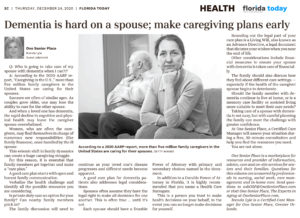
 Brenda Lyle – Special to FLORIDA TODAY
Brenda Lyle – Special to FLORIDA TODAY
Reader question: Who is going to take care of my spouse with dementia when I can’t?
 Answer: According to the 2020 AARP report, “Caregiving in the U.S.,” more than five million family caregivers in the United States are caring for their spouses.
Answer: According to the 2020 AARP report, “Caregiving in the U.S.,” more than five million family caregivers in the United States are caring for their spouses.
Spouses are often of similar ages. As couples grow older, one may lose the ability to care for the other spouse.
And when a loved one has dementia, the rapid decline in cognitive and physical health may leave the caregiver spouse overwhelmed.
Women, who are often the caregivers, may find themselves in charge of numerous new responsibilities (like family finances), once handled by the ill spouse.
This seismic shift in family dynamics can create a huge caregiving struggle.
For this reason, it is essential that family members get together and make a “care plan.”
A good care plan starts with open and honest family communication.
Verbalize the health challenge and identify all the possible resources you are considering.
Is private duty care an option for your family? Can nearby family members pitch in?
The family discussion will need to continue as your loved one’s disease progresses and different needs become apparent.
A good care plan for dementia patients also addresses legal considerations.
Spouses often assume they have the legal right to make all decisions for one another. This is often true … until it’s not.
Each spouse should have a Durable Power of Attorney with primary and secondary choices named in the document.
In addition to a Durable Power of Attorney in Florida, it is highly recommended that you name a Health Care Surrogate.
This is a person you trust to make health decisions on your behalf, in the event you can no longer make decisions for yourself.
Rounding out the legal part of your care plan is a Living Will, also known as an Advance Directive, a legal document that dictates your wishes when you near the end of life.
Other considerations include financial measures to ensure your spouse with dementia is taken care of financially.
The family should also discuss how they feel about different care settings — especially if the health of the caregiver spouse begins to deteriorate.
Should the family member with dementia continue to live at home, or is a memory care facility or assisted living more suitable to meet their care needs?
Taking care of a spouse with dementia is not easy, but with careful planning the family can meet the challenge with greater confidence.
At One Senior Place, a Certified Care Manager will assess your situation during a free, 30-minute consultation and help you find the resources you need.
You are not alone.
One Senior Place is a marketplace for resources and provider of information, advice, care and on-site services for seniors and their families. Questions for this column are answered by professionals in nursing, social work, care management and in-home care. To submit a question, send an email to askOSP@OneSeniorPlace.com or visit One Senior Place, The Experts in Aging at OneSeniorPlace.com.
Brenda Lyle is a Certified Care Manager for One Senior Place, Greater Orlando.


